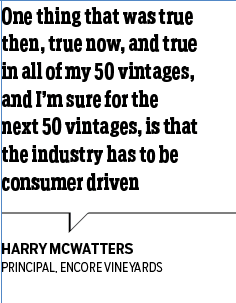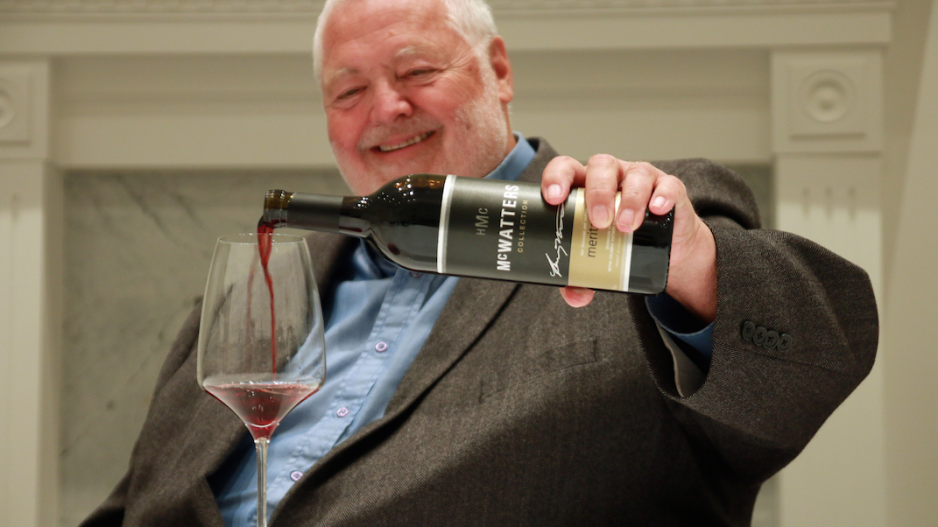Harry McWatters sits in a downtown Vancouver hotel restaurant, having just checked out of his room. He is eager to get on the road to return to the Okanagan, but has agreed to meet a guest for breakfast.
Wearing a breezy summer shirt that has intricate aquamarine patterns, McWatters appears relaxed, although it is clear that there is a lot of work to do when he arrives back at his new Encore Vineyards Ltd. winery. He expects the winery, which he is spending $7 million to build, to be ready to house grape crushing operations this fall.
Encore produced 14,000 cases of wine last year and has been doubling output annually for several years.
“I kiddingly say that I work half days: 7 a.m. to 7 p.m,” said the 72-year-old B.C. wine industry legend with a chuckle.
McWatters is sharp with details and lends his knowledge, gleaned from a lifetime in business, to various organizations where he serves as member, director or volunteer. His trip to Vancouver was primarily for a Fortis Inc. (TSX:FTS; NYSE:FTS) board meeting, although he included some meetings with wine customers as well.
An energy utility may seem to be a strange venture for McWatters to be involved in, given that he has spent his lifetime helping to build various wine ventures, as well as the province’s wine industry. But, in 2003, after subsidiary FortisBC started operating in the province, the company sought to have local business leaders, who represented growth sectors of the economy, on its local corporate board.
After joining FortisBC’s board of directors, McWatters was essentially promoted when he was asked to sit on the Newfoundland-based parent company’s board of directors. That will all end next May, when McWatters turns 73 years old – an age that exceeds the utility’s age limit for directors.
He still has a fire in his belly but McWatters admits that in future years he may slow down a little and take more time off to share with his partner Lisa Lalonde.
His two adult offspring, Christa-Lee McWatters Bond and Darren McWatters, both work at the family business. They agreed among themselves that McWatters Bond will assume the role of CEO whenever their father leaves the business.
For now, at least, McWatters cannot imagine putting his feet up and going on a series of world cruises.
McWatters recently took a 17-day vacation to New Zealand. Even though he could stay in touch with work via email, McWatters said it was too much time to be away from his business.

Navigating McWatters’ path as one of the pioneers of the B.C. wine industry has involved as much dedication and vision as it did risk.
Born in Toronto, McWatters moved to North Vancouver when he was 10. He graduated from the now-closed Delbrook Senior Secondary School, took a job at Canada Safeway and then moved up to a sales manager position at United Van Lines.
His natural aptitude for sales made him a success. He was enticed by Casabello Wines to start as a sales manager in 1968. McWatters jumped at the chance to join Casabello because wine had become his passion.
McWatters first experimented with making wine when he was 16 years old, under the tutelage of some older Italian friends. His interest in the product grew and he developed an appreciation for wine that few British Columbians shared. At the time, most people in the province drank little wine and what they did imbibe was usually a sweet red elixir.
Casabello was one of the first wineries to plant traditional viniferous wine grapes, rather than North American hybrid grapes, in the Okanagan Valley, McWatters said.
The new grapes produced drier wines with more refined flavours, but consumers of the day were not ready – the best wines that Casabello made in the 1960s were the most difficult wines to sell.
“One thing that was true then, true now, and true in all of my 50 vintages, and I’m sure for the next 50 vintages, is that the industry has to be consumer driven,” McWatters said between sips of coffee. “The industry can change consumer preferences, but that’s a slow process.”
He took the lesson that the consumer is always right, as well as others gleaned at Casabello, when he embarked on his first foray as an entrepreneur. In 1979, he bought the Sumac Ridge Golf Course and planted grapevines in some of its fairways.
He collected revenue from the shortened nine-hole course while laying the seeds for his future Sumac Ridge Estate Winery. He officially launched the winery in 1981 by selling a 1980 vintage made on Casabello’s premises.

Much wheeling and dealing took place over the next 19 years, including McWatters’ decision to buy and plant 115 acres of Bordeaux-style grapes in the Okanagan’s Black Sage Bench region. That decision and others helped him earn dozens of awards for his wine.
Sumac ownership would comprise McWatters and partner Bob Wareham, each with 30% stakes, with the remaining 40% held by various private investors. In 2000, that ownership group sold Sumac Ridge to Vincor International Inc. for an undisclosed amount. McWatters stayed at Vincor as a vice-president until 2008, when the company, then owned by Constellation Brands, threw him a retirement party.
In reality, McWatters had no plans to retire.
A week after his so-called retirement, he launched Vintage Consulting Group and was soon working on a project for Constellation.
“I don’t think of what I do as work,” he said.
“It’s my profession. It’s what I do. People don’t have to be in the wine business long to realize that if you’re not living it, it becomes work.”
Industry insiders vouch for McWatters’ devotion and tireless efforts aimed at increasing the industry’s stature.
He was a key member of the BC Wine Appellation Task Force that drafted a series of recommendations and held a plebiscite last year for wine industry stakeholders to vote on. The B.C. Liberal government passed three relatively non-controversial recommendations from the task force into law. McWatters has been lobbying for the new NDP-Green government to pass into law the remaining recommendations, including that all winery owners must be a member of the British Columbia Wine Authority and what regional descriptors they are allowed to put on their bottles.
His passion for the industry was also evident in 1990, when he helped create and was the founding chair of the British Columbia Wine Institute.
That organization’s first executive director, Christine Coletta, remembers regular chats with McWatters at 5 a.m., and that he was always accessible and empowering.
“Not once did he say ‘I’m too busy for you,’ or ‘I don’t have time for this,’” she said.
“He would sit down with me, he would take the time and his typical response to me was, ‘What do you think you should do here?’ I would tell him and he would say, go ahead and do it. His famous line to me was ‘85% of the time you will be right, and the other 15%, you’ll be forgiven for.’” •




